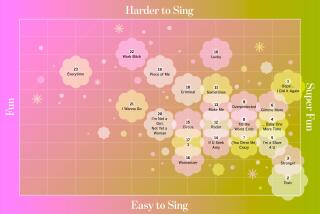The Goods : CYBURBIA : A Date With Claire Is Harmonious Fun
- Share via
At my last singing lesson, my vocal coach told me that my diatonic scales were excellent.
My intonation was “much better,” and overall I was doing a “great job.”
My coach is a computer program. No human could lie that sincerely.
Claire: the Personal Music Coach is a program you sing to in the privacy of your home, a kind of karaoke for one, but with a serious purpose. As you repetitively sing scales into the microphone that comes with most Macintosh computers (a version of the program for personal computers is due out later this year), the program uses “proprietary pitch recognition technology” to analyze your tones.
In this way, Claire is supposed to help you learn to hit notes on pitch, develop “inner hearing” and improve sight-reading skills.
Sure. Give it your best shot, Claire. I am your ultimate challenge.
Claire is from Opcode Systems and costs $129.95 list, $80 “street” (software almost never retails for the manufacturer’s list price). Once loaded onto the computer, Claire begins talking through the speaker in a pleasant, encouraging female voice that welcomes you and explains, “I am your teacher for intonation, ear training and solfege.”
“I am strict but fair,” she informs you, “and always available for you. I can talk, sing and hear you.”
Sort of like a cross between Santa Claus and Chuckie the demon doll.
After putting you through a battery of tests to gauge the range of your voice (mine was a paltry 1 1/2 octaves), the exercises--of which there are more than 500, according to the manual--begin.
Notes appear on a music staff in the colorful “practice window,” and Claire explains that you are to sing them after her. When the singing symbol--a little computer with Dumbo-like ears--appears, it’s your turn. As you sing, red arrows show if you are singing the note too low (flat) or too high (sharp). A filled-in note means you hit it just right (within an adjustable tolerance). If the note turns into a square, you are way out of the ballpark.
Claire gives you an encouraging “OK” even if you miss them all, then makes you do them over. If you get many of them correct, you get a “good job” or “excellent.”
The exercises get harder as you go along, mixing in random note combinations and calling upon you to sight-read short passages without Claire singing them first.
The program keeps a running log and chart--both of which can be printed--to show your progress or lack thereof.
You can stop and take a breather anytime. If you go longer than about 17 minutes at a stretch, Claire will start reminding you: “You might want to take a break now!”
Does it work? I did learn that if I concentrated, I could hit many of the notes Claire threw at me. Unfortunately, even when I was right on pitch, my singing voice still had all the timbre of a foghorn.
Claire can neither overcome an inherited lack of talent (I got my singing voice from my mother) nor train a voice in the qualities beyond pitch that go into making it a true musical instrument.
It is more appropriate a tool for those who do have some singing talent and want to practice hitting notes on pitch. And it does offer tantalizing prospects for the future. Officials at Opcode, Claire’s Palo Alto-based distributor, say they will soon add adaptations to the program to allow it to be used with a variety of musical instruments.
I’d like to tell you more, but it’s time for my lesson. One thing that is truly miraculous about Claire--she never gets tired of hearing me sing.



